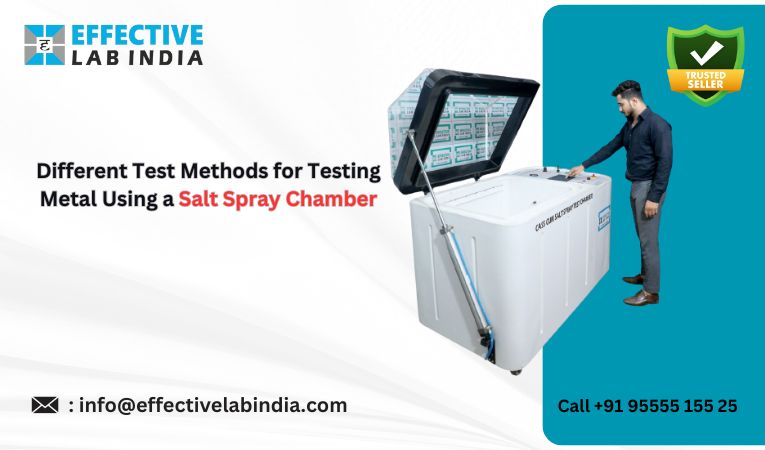Different Test Methods for Testing Metal Using a Salt Spray Chamber

Metal testing is crucial for ensuring the strength, reliability, and longevity of materials used across various industries. With the increasing demand for corrosion-resistant materials, salt spray chambers have become essential tools for evaluating metal surfaces. Effective Lab India, a leading manufacturer of testing equipment, offers a range of advanced salt spray chambers to address diverse metal testing needs.
What is a Salt Spray Chamber?
A salt spray chamber, or salt fog test chamber, is specialized equipment designed to test the corrosion resistance of metals and coated surfaces. It replicates harsh environmental conditions, such as salt-laden atmospheres, to accelerate the corrosion process and evaluate how metals perform under these conditions.
Salt Spray Chamber Procedure
In a salt spray chamber, test specimens are continuously exposed to a fine mist of a salt solution. This simulated environment mimics the corrosive effects of salty surroundings like coastlines and de-icing salt on roads. The chamber allows for adjustable exposure times and intensities tailored to specific testing requirements.
Why Metal Testing is Essential
Corrosion Resistance
Corrosion can compromise the structural integrity and functionality of metal products. Testing metals in a salt spray chamber helps manufacturers identify weaknesses and improve corrosion resistance, extending the lifespan of their products.
Quality Assurance
Metal testing is a key component of quality assurance, ensuring products meet necessary standards and specifications. This is critical in industries where safety and reliability are paramount, such as automotive, aerospace, and construction.
Industry Compliance
Many industries are subject to strict regulations requiring specific metal testing procedures. Salt spray testing helps companies adhere to these standards, avoiding penalties and maintaining market access.
Key Test Methods for Metal Testing Using a Salt Spray Chamber
Neutral Salt Spray (NSS) Test
- Overview: The NSS test is the most common method for assessing metal and coating corrosion resistance. It involves exposing specimens to a neutral pH salt spray environment using a 5% sodium chloride solution.
- Procedure:
- Prepare and clean the test specimens.
- Position the specimens in the chamber at a specified angle.
- Set the chamber to spray the salt solution at around 35°C (95°F).
- Monitor specimens for a period ranging from hours to weeks, depending on test requirements.
- Applications: Widely used in automotive, marine, and construction industries.
Acetic Acid Salt Spray (AASS) Test
- Overview: This variation of the NSS test adds acetic acid to the salt solution to create a more aggressive testing environment with a lower pH.
- Procedure:
- Mix acetic acid with sodium chloride solution to achieve a pH of about 3.1.
- Conduct the test at a chamber temperature of 50°C (122°F).
- Observe for signs of corrosion such as rust or blistering.
- Applications: Ideal for testing metals with protective coatings, such as anodized aluminum.
Copper-Accelerated Acetic Acid Salt Spray (CASS) Test
- Overview: The CASS test incorporates copper chloride into the salt solution to accelerate corrosion.
- Procedure:
- Add copper chloride to the acetic acid and sodium chloride solution.
- Expose specimens at 50°C (122°F).
- Monitor for rapid corrosion.
- Applications: Suitable for evaluating decorative coatings like chrome plating.
Cyclic Corrosion Testing (CCT)
- Overview: CCT simulates real-world conditions by alternating between salt spray, humidity, and drying cycles, providing a more comprehensive assessment of long-term corrosion resistance.
- Procedure:
- Program the chamber to cycle between salt spray, high humidity, and dry air.
- Expose specimens to these cycles for a predetermined period.
- Evaluate the corrosion patterns.
- Applications: Common in automotive and aerospace industries.
Detailed Overview of Test Methods
Comparing Approaches
Different test methods offer varying degrees of corrosion severity. NSS is suitable for general testing, while AASS and CASS are better for more severe conditions requiring enhanced resistance.
Appropriate Metal Types
- NSS: Best for metals coated with zinc, aluminum, and steel.
- AASS: Optimal for coated metals like galvanized steel.
- CASS: Ideal for metals with ornamental coatings such as chrome.
Factors Affecting Test Results
- Metal Content: Corrosion resistance varies with the metal’s composition. For example, stainless steel generally performs better than carbon steel in salt spray tests.
- Environmental Conditions: Consistent temperature, humidity, and salt concentration are crucial for reliable results.
- Test Duration: Longer exposure increases rusting, so test duration should reflect the metal’s intended use.
Applications of Salt Spray Testing Across Industries
Automotive Industry
Ensures vehicle parts withstand road salts and harsh weather conditions.
Aerospace Industry
Selects metals that endure extreme environmental conditions.
Marine Industry
Verifies the durability of metals used in saltwater environments.
Construction Industry
Evaluates metals used in building structures and infrastructure.
Advantages of Salt Spray Chambers
Accurate Simulation
Replicates real-world corrosive conditions for reliable performance predictions.
Cost-Effective
Provides valuable data without expensive field tests.
Rapid Results
Accelerates corrosion testing to deliver quick results for material and design decisions.
Effective Lab India’s Expertise
Effective Lab India provides modern salt spray chambers with advanced technology for precise testing. Their chambers are customizable to meet specific industry needs and are praised for their reliability and efficiency, reflecting the company’s commitment to excellence.
Choosing the Right Salt Spray Chamber
Key Considerations
When selecting a salt spray test chamber, consider size, metal types, and test methods.
Recommendations
Effective Lab India offers expert advice to ensure you select the right chamber for accurate results.
Conclusion
Salt spray testing is crucial for assessing metal and coating corrosion resistance. Understanding various test methods and their applications helps make informed decisions on material selection and product design. Effective Lab India’s cutting-edge salt spray chambers deliver the precision needed for thorough metal testing across industries.





